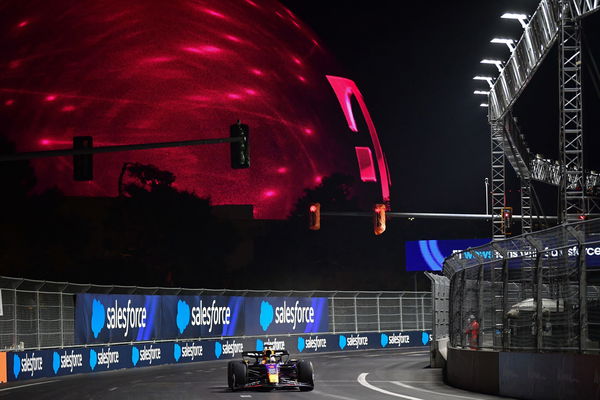
USA Today via Reuters
Nov 16, 2023; Las Vegas, Nevada, USA; Red Bull Racing driver Max Verstappen of The Netherlands (1) during free practice at Las Vegas Strip Circuit. Mandatory Credit: Gary A. Vasquez-USA TODAY Sports

USA Today via Reuters
Nov 16, 2023; Las Vegas, Nevada, USA; Red Bull Racing driver Max Verstappen of The Netherlands (1) during free practice at Las Vegas Strip Circuit. Mandatory Credit: Gary A. Vasquez-USA TODAY Sports
There’s a silent force that’s steering Formula 1 in a particular direction. It’s not the teams, not the drivers’ skill, or the cutting-edge technology. It’s the relentless pursuit of profit, an ever-growing multibillion-dollar industry, that leaves a trail of questions about the legacy and soul of this iconic racing spectacle. Beyond the racetracks and the high-speed wonder, a candid revelation by an F1 Insider has exposed a disconcerting truth—money reigns supreme.
In 2016, Liberty Media seized control of the Formula 1 Group, setting the financial gears in motion with a staggering $4.4 billion acquisition. The pulse of Formula 1 beats through TV rights, with Liberty Media boasting television contracts worth over $587 million globally. This colossal figure, fueled by the Netflix documentary Drive to Survive, underscores the sport’s rising popularity.
ADVERTISEMENT
Article continues below this ad
The bottom line has changed Formula 1 forever
As fans revel in the high-speed spectacle of Formula 1, a stark contrast emerges when compared to other sports like tennis, golf, or cricket. The preservation of historic venues, a hallmark of these sports, takes a backseat in F1. In a recent YouTube Live chat, Peter Windsor unearthed the uncomfortable truth—money eclipses the sport’s reverence for heritage.
During the live chat, a fan asked why Formula 1 doesn’t promote and preserve its historic tracks as other sports do. “The problem in comparing Formula 1 with tennis or golf or cricket or whatever is that money is much more important in Formula 1,” Peter explained. “The teams need the money to go racing to employ all the people and do all the things they do and have the motor homes they have. And because of that, money is always foremost in everybody’s mind even if they may say, ‘Isn’t it wonderful to go back to a great classic track like Spa.'”
“They always say that, don’t they? You know, in the press releases in the buildup to the Belgian Grand Prix. Or we’re going to Monaco now, one of the great historic races. Or Silverstone, one of the great tracks. But it’s all about money ultimately. If the whole LIV [Golf] situation suddenly began in Formula 1, and every driver was paid $45 million to race in a Saudi Arabian Grand Prix on the same day as the British Grand Prix, I think Formula 1 would go to Saudi Arabia,” Peter added.
Read More: What are the Budgets for F1 Teams Including Mercedes, Red Bull & Ferrari?
However, as part of the question of what Formula 1 can do about this problem, Windsor offered a unique solution.
F1 needs to recreate historic tracks at profit-driven locations
Can Formula 1 preserve its legacy while embracing the financial juggernaut it has become? Peter Windsor suggested a nuanced solution, one that could maintain the sport’s essence while satisfying financial aspirations. “We may not be able to sustain some of these classic races because of finance, because of the congestion caused by a street race,” Windsor reflected, referring to the Las Vegas GP. “Spa [is] always slightly on the edge financially,” he added. It’s inevitable for new circuits to join the calendar, but it’s up to them to carry forward the legacy of historic tracks, per Windsor.
ADVERTISEMENT
Article continues below this ad

via Reuters
Formula One F1 – Monaco Grand Prix – Circuit de Monaco, Monte Carlo, Monaco – May 28, 2023 Red Bull’s Max Verstappen leads into the first corner at the start of the race ahead of Aston Martin’s Fernando Alonso REUTERS/Piroschka Van De Wouw
“It is the new circuits that come in with the money [that] should be encouraged to build renditions of the classic circuits, whether it be the Nürburgring, Spa, or Monaco. Let’s build them, let’s build the Monaco Grand Prix circuit in the middle of the desert if that’s what they want.” Isn’t that what the Circuit of the Americas in Austin, Texas is? Largely inspired by iconic tracks like Silverstone, Hockenheim, and Interlagos (plus Istanbul’s Turn 8), it’s a circuit that drivers love.
Whether it’s recreating Monaco in the middle of the desert or fashioning the Nürburgring in a new-wave country, the idea is to preserve the spirit of classic tracks while aligning with the economic realities of Formula 1.
ADVERTISEMENT
Article continues below this ad
Watch This Story | Most glamorous Formula 1 WAGS
In a sport where speed is everything, F1 finds itself at a defining moment. As the debate rages on, the F1 community is left to ponder whether money truly makes the world go round, even if it means sacrificing the legacy of iconic racetracks at the cost of financial success.
ADVERTISEMENT
ADVERTISEMENT
ADVERTISEMENT
ADVERTISEMENT

